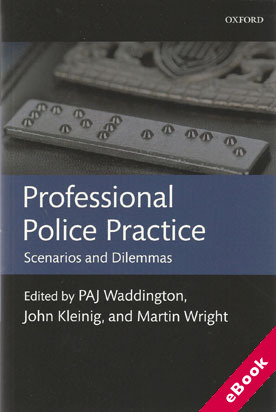
The device(s) you use to access the eBook content must be authorized with an Adobe ID before you download the product otherwise it will fail to register correctly.
For further information see https://www.wildy.com/ebook-formats
Once the order is confirmed an automated e-mail will be sent to you to allow you to download the eBook.
All eBooks are supplied firm sale and cannot be returned. If you believe there is a fault with your eBook then contact us on ebooks@wildy.com and we will help in resolving the issue. This does not affect your statutory rights.
This ground-breaking book offers a practitioner-oriented overview of professional standards in all aspects of policing. With a radical, scenario-based approach, featuring both the extraordinary and the seemingly mundane, it aims to capture some of the complexities and interpretations that form the basis of such professional standards in policing today.
Awareness of professional ethics has become not only a central requirement of officers seeking promotion to the senior ranks, but also a necessity within the training framework of UK policing, so the editors have brought together contributions from both practitioners and academics in order stimulate debate and present contrasting views.
Split into five parts, each begins with a realistic scenario posing a distinctive dilemma, not just ethical but also legal and political. Ranging from community policing and the use of intelligence to problems arising from the conduct of superiors, the scenarios invite the reader to place themselves in the midst of an acute policing dilemma and asks how they would navigate an appropriate path through it to a desirable end.
As the reader considers such questions, contributions from police officers both in the UK and abroad, as well as academics connected to the policing world, offer personal and professional responses to the situation at hand - resulting in wildly differing but no less important opinions. Finally, each of the five parts concludes with commentary from the editors which, rather than offer solutions, seeks to frame both the scenario and response within a more neutral setting.
Equally, and perhaps understandably, these commentaries also throw into sharp relief the plethora of opinions and perspectives that have yet to be addressed. Professional Police Practice represents a considered but innovative evaluation of the nature of professional standards within policing, using common, everyday dilemmas that any police officer would recognise.
By drawing on a range of opinions, from different areas of policing and different jurisdictions, the editors hope to inspire a degree of reflection and self-examination in anyone, either within policing or connected to it, as they consider the dilemma and their own response to it, and challenge them to recognise similar difficulties in their own operational roles.